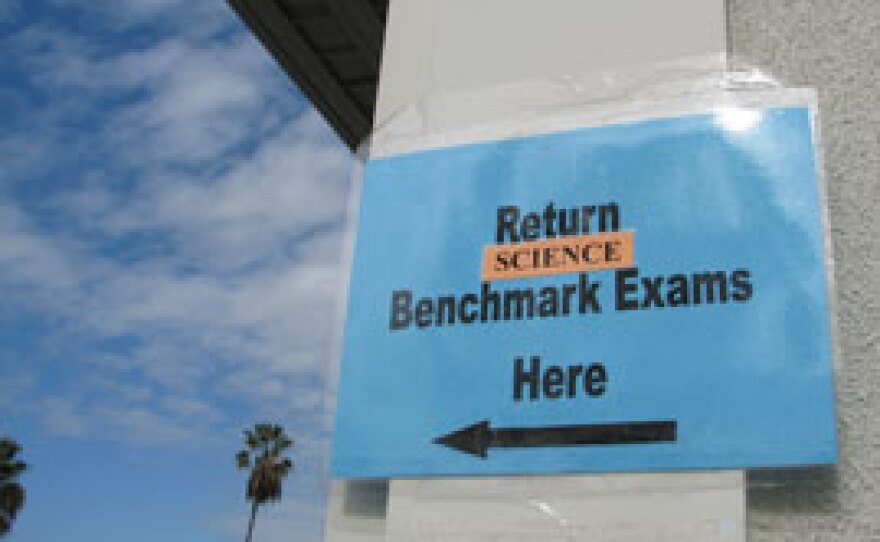Most adults remember taking a test or two in grade school. But few would recall taking upwards of 16 tests in a single year. That's the reality some school kids face in the San Diego Unified School District. Parents and teachers are calling it a 'testing frenzy.' But administrators say the exams are needed. KPBS Education Reporter Ana Tintocalis has this report.
Lily Morache is a nine-year-old girl who goes to Benchley-Weinberger Elementary in San Carlos.
Lily:
I love to read and I love to write. One of my favorite subjects in school is science.
Lily's blonde hair is tucked under a baseball ball cap. A book bag is slung over her shoulder. She says she's always enjoyed going to school, but that's beginning to change this year.
Lily:
It gets really frustrating because it's like we have tests every single day. My teacher is Mrs. O'Hara, so I sometimes I say, 'Mrs. O'Hara, can you please stop giving us tests.' It's just annoying.
Lily says she and her classmates got so annoyed they began telling their parents every time they took a test. Chris Morache, Lily's mom, says the amount of testing this year is ridiculous.
Chris Morache:
You almost wonder, are these administrators who are looking to keep their jobs, so if they keep writing more tests, we'll have to keep giving them?
Most educators acknowledge testing has greatly increased over the past few years. They say that's because federal education officials hand out sanctions when districts fail to meet academic targets under the No Child Left Behind Act.
In an effort to avoid sanctions, San Diego Unified has created its own set of district tests to prepare students and to gather more data on performance.
Karen Bachofer is director of standards and evaluation at San Diego Unified.
Bachofer:
We use these tests as early warning systems to tell us whether or not we are doing a good job with helping our kids meet standards. And so we need those early indicators.
Screening tests, diagnostic tests and benchmark tests will now be handed-out several times a year. There's also "end of unit" exams which some students take every time they've covered one part of a lesson in class. State and federally mandated tests are also given. On top of that, there are regular quizzes and pre-tests.
The average elementary school student is taking a couple dozen tests this year. Teachers say it's testing overload. But Bachofer says it’s just about right.
Bachofer:
I don't believe the level of assessments, or the amount of assessments that we have in our district assessment calendar, are overwhelming.
Raul Mora:
I don't know how long they've been out of the classroom, so I think they've lost touch with how it is and how it feels to be classroom.
Raul Mora teaches sixth grade at Baker Elementary in South San Diego. He says administrators don't explain the purpose behind the exams, who's ordering the tests, and how to use the data in meaningful ways.
Mora says he spends more time scoring and recording the results than using them to develop effective lesson plans.
Mora:
I come home late, I go (to school) early. I still can't get a good handle on it. And it’s tough. They (administrators) want to see results but weren't not given proper instruction, proper support from the district.
Lea Hubbard says that's a widespread concern. Hubbard is a professor in the School of Leadership and Education Sciences at the University of San Diego.
She says new technologies allow administrators to get immediate feedback. But she says teachers aren't being taught how to use the information in practical ways.
Hubbard:
There hasn't been enough professional development around helping teachers to deconstruct what these test scores mean, and then what to do about it. Its not an easy translation.
District officials admit they are not effectively communicating the purpose and meaning behind some of these tests.
There are two separate departments in the district creating tests, and those two departments don't always talk with each other.
Carol Barry, a top administrator in one of those divisions, admits there is a lot of testing going on.
Barry:
Perception is reality in my head. So I think that (testing) is something we'll have to work on…to make sure people understand what is the purpose behind each of the assessments and how many assessments we need in a district this size.
And that might be music to the ears of parents like Chris and Lily Morache.
Chris: Its elementary school. I think our goal is to get kids to love coming to school, to love the education process, and the process of learning and being excited. And we're taking that away from them.
Lily:
Yeah, its not working.
Administrators say they plan to meet with school principals later this month to take stock of which tests are helpful and which ones interfere with learning.
Ana Tintocalis, KPBS News.






